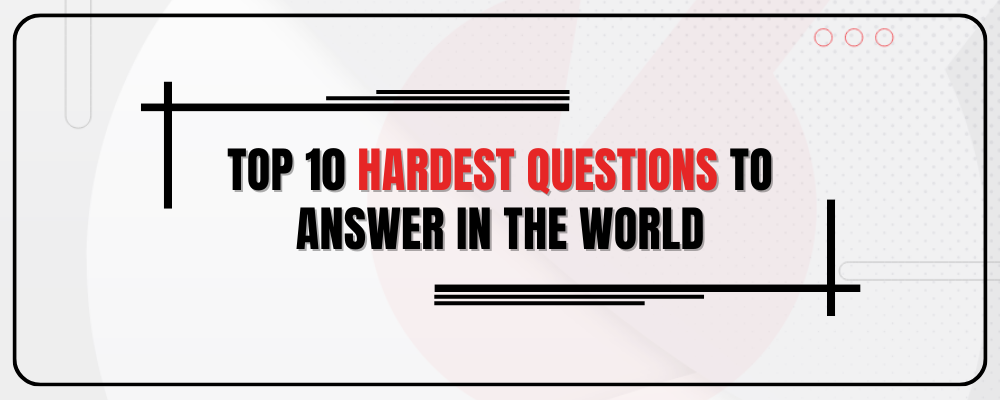1. What happens after death?

The question of what happens after we die is a mystery that people have wondered about for a very long time. Different people have different beliefs. Some think about heaven or an afterlife, where they might go to be with loved ones again. Others believe in reincarnation, where they come back in a new form or body.
Mark Twain once said, “I do not fear death. I had been dead for billions and billions of years before I was born, and had not suffered the slightest inconvenience from it.” This idea suggests that before we were born, we didn’t experience anything, so maybe it’s similar after we die.
The difficulty with this question is that it touches on our deepest fears and hopes. It’s a mystery because no one really knows for sure. Different cultures and religions have their own explanations, and some people find comfort in their beliefs about what happens after death.
At the end of the day, it’s a question that might always remain unanswered, and people find their own ways to make sense of it.
2. Is there a God, and if so, what is the nature of God?

The question of whether God exists or not, and if so, what is the nature of God has been deeply debated since the beginning. People from diverse backgrounds and beliefs tend to answer this question but nobody has yet proved anything in favor or against the existence of God with evidence.
People from theistic beliefs, the idea of the existence of God comes from religion.
In Christianity, the Bible asserts, “In the beginning, God created the heavens and the earth” (Genesis 1:1).
Similarly, Islamic tradition emphasizes the oneness of God with the Shahada: “There is no God but Allah.”
Conversely, atheistic and agnostic viewpoints never agreed upon the theistic explanation of God. They say there’s NO evidence or reason to believe in a higher power.
Richard Dawkins, an outspoken atheist, characterizes the God of the Old Testament as “arguably the most unpleasant character in all fiction.”
Pantheism and panentheism propose different relationships between God and the universe.
Albert Einstein, with a pantheistic inclination, expressed awe for the mysterious nature of this universe: “The most beautiful thing we can experience is the mysterious. It is the source of all true art and science.”
Deism acknowledges a higher power that created the universe but may not intervene in ongoing affairs.
Thomas Jefferson, a Deist, suggested a perception of design and skill in the universe: “When we take a view of the Universe, it is impossible for the human mind not to perceive and feel a conviction of design.”
Existentialist thinkers, exemplified by Jean-Paul Sartre, approached the question from a very unique point, saying “If God does not exist, we are responsible for creating Him.”
From a scientific standpoint, figures like Carl Sagan advocate for natural explanations. Sagan’s perspective, “The cosmos is within us. We are made of star-stuff.”
Thus, there’s no one way of saying if God exists or not. The explanation lies in the multiplicity of beliefs and the inherently subjective nature of faith.
3. What is the origin of the universe? what happened before the Big Bang?

The origin of the universe and what existed before the Big Bang is not only one of the most difficult questions to answer but is one of the most asked, especially by young kids when they first begin to learn about science.
Scientists come up with the most logical explanation of the Universe’s origin by observing the continuous expansion of all the galaxies, stars and elements in space. So if everything is spreading out, they must have been joined together in the beginning, right?
Scientists have also calculated the time when it all started by reversing the time and figured out that the Big Bang happened 13.8 billion years ago.
However, the question of what initiated the Big Bang or what, if anything, existed before it remains unanswered within scientific understanding.
And there comes the opportunity for philosophical speculations.
Some philosophies propose concepts like eternal inflation or multiverse theories, suggesting the existence of multiple universes or cyclical patterns of cosmic expansion and contraction.
Others, such as Aristotle, questioned whether the universe has always existed. This perspective comes in variety with insufficient evidence and logical explanations.
Whereas, Janna Levin tends to conclude the debate by saying, “There is a big question: What happened before the Big Bang? It’s like asking what happened before the moment time began. It just doesn’t make sense.”
Despite how difficult to answer this question is, Neil deGrasse Tyson tried to calm everyone down with his famous saying, “The universe is under no obligation to make sense to you.”
4. Do Aliens Exist?

The question of whether there are aliens out there is something scientists and people are curious about. Scientists look at planets in other star to see if they could find life other than human in this universe.
As the famous scientist Carl Sagan said, “The universe is a pretty big place. If it’s just us, seems like an awful waste of space.” This means that with so much space out there, it’s possible that there might be other forms of life.
Stephen Hawking added a logical perspective, saying, “To my mathematical brain, the numbers alone make thinking about aliens perfectly rational.”
This means that when we look at the vastness of space, it makes sense to consider the possibility of other life forms.
Despite finding planets that could support life, we haven’t found clear evidence of aliens yet.
The universe is vast, and technology is getting better, so scientists keep looking and exploring. While we don’t have a definite answer, the search for aliens is an exciting and ongoing part of science.
5. How did life originate on Earth?

The question of how life originated on Earth is yet another difficult question to answer for anybody.
However, science, as always, approached this question to find how life came into being and proposed different theories.
One such theory is abiogenesis which says that life emerged from non-living matter through a sequence of chemical reactions.
As biologist J.B.S. Haldane noted, the origin of life is a unique event that cannot be replicated. This theory proposes that, under specific conditions, simple organic molecules could have formed and evolved into more complex structures, leading to the first living organisms.
Some scientists point to hydrothermal vents as potential hotspots for these crucial chemical processes.
Recent research into extremophiles, organisms thriving in extreme conditions, has added another dimension to the discussion. Some scientists speculate that life might have originated in harsh environments like deep-sea hydrothermal vents or acidic hot springs.
Religion on the other hand associates the answer to this question with All Mighty God. The One who is capable of creating anything from nothing.
For instance, in Christianity, the Bible’s account of creation in Genesis portrays God as the ultimate creator, stating, “In the beginning, God created the heavens and the earth” (Genesis 1:1, New International Version). The subsequent verses go on to describe the creation of living beings, including humans.
Similarly, in Islam, the Quran addresses the creation of life, with verses emphasizing the creative power of Allah. For instance, Surah Al-Anbiya (21:30) states, “Do not those who disbelieve see that the heavens and the earth were a closed-up mass, then We opened them out?” Such verses are central to Islamic beliefs about the divine origin of life.
Judaism, too, has its own narrative of creation found in the Torah, where God is depicted as the creator of all living things.
Despite the scientific theories and religious explanations of the origin of life, the exact process of life’s origin remains unknown.
6. What is dark matter? what is dark energy?

The exploration of dark matter and dark energy is one of the most challenging question of the world.
As Neil deGrasse Tyson puts it, “Dark matter is interesting. Basically, the universe is heavier than it should be. There’s a whole swath of stuff we can’t account for.”
This statement describes the essence of dark matter—an invisible substance exerting a gravitational effect on everything in the universe.
In the words of Brian Greene, “The evidence for dark energy is essentially that it exists.” tells the unique challenge posed by dark energy which is a mysterious force accelerating the expansion of the universe, yet remaining hidden in terms of direct observation or measurement.
Vera Rubin, a pioneering astrophysicist, acknowledges the observable effects of dark matter, stating, “We know there is some dark matter out there because we can see its gravitational effects on galaxies and galaxy clusters. But we still don’t know what it is made of.”
Rubin’s words highlight the observational evidence supporting the existence of dark matter while admitting the persistent mystery of what it exactly is.
7. What is the nature of time?

We know that time is about years, months and days, etc. but how does it all start, what makes it and are we capable of measuring the absoluteness of time? is one of the hardest questions to answer because it certainly is not just about our clocks.
Scientists like Albert Einstein showed that time is connected to space, forming a concept called spacetime. This idea changed how we see time, showing that it’s not the same everywhere.
Physicist Stephen Hawking added that time has a one-way flow from the past to the future. This direction is linked to the increase in disorder, or entropy, in the universe. It’s a bit confusing because it goes against our everyday experiences.
Thinking about time also brings up big questions about existence. Philosopher Heraclitus said, “You can’t step in the same river twice,” meaning each moment is different and always changing. This challenges our idea of things staying the same.
On a personal level, psychologist William James noticed that our feelings and experiences affect how we see time. It’s not just about seconds ticking by; it’s about how we feel those moments.
So, the difficulty in understanding time comes from a mix of complicated science, deep questions about life, and the personal way each of us experiences it. It’s like trying to figure out how everything fits together in the world.
8. What is the ultimate fate of the universe?

Figuring out what will happen to the universe in the end is difficult. However, scientists talk about a few possibilities.
One is that it keeps expanding forever. Another idea is a “Big Crunch,” where everything comes back together. And there’s also the thought of a “Big Freeze,” where the universe slowly cools down.
Each idea brings its own challenges. Some theories depend on things like dark energy, which we don’t fully understand.
The question gets even more interesting when we consider what famous scientists like Albert Einstein said. He once called the universe’s comprehensibility “the most incomprehensible thing.” This means that even though we can learn a lot, there’s always something about the universe that’s hard to grasp.
So, nobody knows the final destination of the universe. It’s a mix of scientific theories and a sense that there’s always something about the cosmos that we might find hard to fully understand.
9. What is the meaning of life?

The meaning of life is a big question that we all have thought about at least once in our lifetime.
Some think it’s about finding happiness, others believe it’s connected to doing good things or following a certain purpose.
Philosopher Albert Camus once said, “The meaning of life is the most urgent of questions.” This shows that figuring out life’s purpose is something many find important and pressing. People often look to religion, personal experiences, or relationships to find meaning.
Religions sometimes say life has a purpose, like following a divine plan. But many others see it differently. A lot of people find meaning in their own experiences, relationships, and the things they care about.
Existentialist thinker Jean-Paul Sartre believed that life’s meaning is something we create for ourselves through the choices we make. It’s about finding our own purpose rather than having it given to us.
So, the meaning of life is a bit like a personal journey. Some find it in religion, others in personal experiences, and some in the choices they make. It’s a big question, and different people have different answers.
10. What is your monthly salary?

The question of earnings is not just about a simple number, it involves a mix of factors that make it quite complex. As Zig Ziglar said, “Rich people have small TVs and big libraries, and poor people have small libraries and big TVs.” This shows that financial situations are influenced by various choices and circumstances.
Also, earnings are not solely tied to a job title, they depend on skills, experiences, opportunities, networks, and even cultural and family backgrounds. Napoleon Hill’s idea that “you can succeed best and quickest by helping others to succeed” highlights that success and earnings often involve collaboration and support.
Adding to the complexity, earnings can vary based on where you are in the world, the local economy, and the resources available. So, when someone asks, “How much do you earn?” it’s like asking for a simple answer to a much bigger and more nuanced question about someone’s financial journey.
In simple terms, the question about earnings isn’t just about a number; it’s about the various experiences, choices, and external factors that shape an individual’s financial situation.






